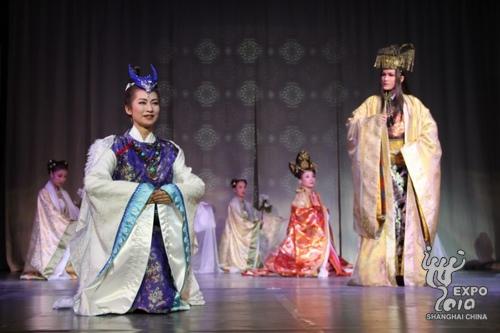Nara Week held in Japan Pavilion
 |
| Artists perform a drama depicting the story of Abe no Nakamaro (698–770), a Japanese diplomat who studied in China during the Tang Dynasty (618-907). |
A week featuring Japan's Nara Prefecture kicked off at the Japan Pavilion on July 23 with a stage drama depicting a Japanese envoy to ancient China's Tang Dynasty (618-907).
People can visit Nara to enjoy Chinese culture because the prefecture preserved many shrines, temples, Buddha statues and wall paintings related to Chinese culture, said Kubota Osamu, vice governor of Japan's Nara Prefecture.
The area also has beautiful natural scenery as well as a number of traditional holidays, he added.
The year 2010 is also the city of Nara's 1,300 year anniversary as a former capital of Japan, and Nara week at Expo 2010 is one of the series of events celebrating the anniversary, he said.
He hoped that Nara Week will attract more people to visit Nara to experience its culture and promote friendship as well as cooperation between China and Japan, Kubota added.
On the stage of the Japan Pavilion, 30 lucky visitors from the audience stepped up to pose for photos with Nara mascot Sentokun.
A theater troupe staged a drama depicting the story of Abe no Nakamaro (698–770), a member of a Japanese envoy to China's Tang Dynasty (618-907). The all-female theater troupe, OSK Nihon Kagekidan, presented the diplomat's trip from the then Japanese capital Nara to then Chinese capital Chang'an (now Xi'an) and his life as an active Japanese figure in Sino-Japanese ties.
Audiences responded to the drama with applause.
The Japanese founded their capital in Nara in 710 and the city became prosperous as Japan's first international capital.
Nara week will last through July 29. During the week, visitors can pose for photos with Nara mascot Sentokun, enjoy the Abe no Nakamaro drama and participate in a quiz for a chance to win a souvenir hat of Nara Week.
 0
0 






